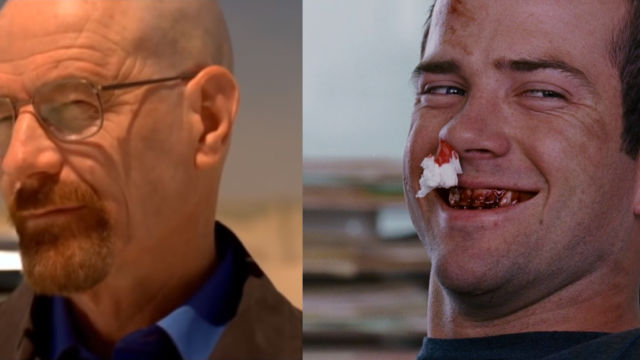For years, people have been saying that Walter White’s arc is not one of change, but of either decline or revelation – that he is a fundamentally static character whose sense of change comes from the audience’s perception of him shifting. I always thought this was nonsense; on a superficial level, almost none of Walt’s behaviour towards the end of the series resembles any of his behaviour at the start outside of his propensity for lying. Walter at the start of the story is a milquetoast, passive-aggressive high school chemistry teacher; Walter just past the middle is a violent, brash, openly arrogant drug dealer; Walter at the end is a quietly confident murderous drifter. I get that what people mean is that he was always motivated by bitterness and pride, but even then, his leaning down on that is an active process of change. Walt is fundamentally a scientist who approaches his descent into evil the exact same way he does cooking meth – testing a hypothesis, examining the results, and taking up ideas that work while discarding ones that don’t. If his pride is stable, it’s the only stable thing about him.
It was watching, of all things, Fast & Furious: Tokyo Drift that cleared up my confusion, because it really does show a character who changes his motivation. At the beginning of the story, Sean is a ne’er-do-well who happily burns up every community he falls into because he has no interests beyond chasing the next car chase and the next adrenaline high. His arc is one of developing a community, connections, and sense of honour and respect. The emotional climax isn’t the final car chase, but the scene that instigates it in which Sean reaches out to the local gangster, apologises for his destructive behaviour, and offers a diplomatic solution that will peacefully end the violence. To put it another way, Sean exchanges one motivation for another. Perhaps this is what people really expect when it comes to character development – that a character will change rather than refine their motivation? This is definitely something I’ll keep in mind moving forward as I listen to people discuss character development.
To bring us back to the only subject that matters, I ended up thinking about the two most static characters on The Shield – Vic and Dutch. Vic can arguably be thought of as the most static character because he almost completely refuses to change over the course of the show’s seven seasons, shaking off almost anything that happens to him. Dutch can arguably be thought of as the most static character because he is the only one to neither rise nor fall, ending in the same position he started in. Vic’s motivation isn’t just static, it’s inherently stasis – he wants to continue doing what he was doing in the first season, and part of his cleverness is being able to justify his methods in a wide variety of contexts. Dutch’s motivation really does change over seven seasons – he drops certain motivations and picks up new ones. Some because he achieves them, some because he can’t achieve them, and some because he could achieve them but doesn’t want to. His consistent stable thing is his process; one way of looking at him is that he’s a hammer who has perfected the art of finding a nail.


